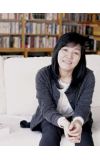
06 Aug 2011 17:03:31
The distinction made all the difference for novelist Kyung-Sook Shin, whose book "Please Look After Mom" has made a splash in the United States and is a best-seller in her native South Korea.On a recent day in New York, Shin discussed, through her translator, the popularity of the novel and its universal themes of mother and child, and the gradual realization that all our moms actually have a life outside the family and are women with thoughts and desires.The book centers on a modern-day family coping with grief when their mother, known only as Mom, vanishes in a busy city train station. The story tracks the woman's disappearance through the eyes of her children, her husband and, ultimately, through her own words.The first line reads: "It's been one week since Mom went missing."As a teenager, Shin had taken the night train to Seoul with her mother and thought to herself that when she became a writer she would write an ode to her mom. Shin contemplated the book for years, thinking of the character as "Mother," but was unable to set anything on the page.Then one day, the first line suddenly came to her, and the use of "mom" changed everything."It surprised me," she said. "Everything flowed very naturally ... as though a door had opened."Shin is one of South Korea's most widely read and acclaimed authors. She was honored with the Manhae Literature Prize, the Dong-in Literature Prize and the Yi Sang Literary Prize, as well as France's Prix de l'Inapercu. She had dreamed for years of becoming a writer and published her first work of fiction in a Korean literary journal at 22.Shin grew up on a farm with many brothers and sisters. She was an avid reader, even though there weren't many books available."As my older brothers would borrow books and bring them into our house, I would read the books and find out about a world I didn't know," she said. "I would just take them away to into my space, and they would come look for me or the books."She papered the windows of her room so that she could focus, reading entire anthologies, history books, whatever she could get her hands on."My mother was very happy to see me read," she said.Most of the younger children out in the country were expected to help with farm work, she said, not become writers. And so, Shin went to Seoul to study, with her family's blessings. From the time she was 16 to age 30, she worked all sorts of jobs so she could write — editing at a publishing house, writing for a radio station, tutoring children.

